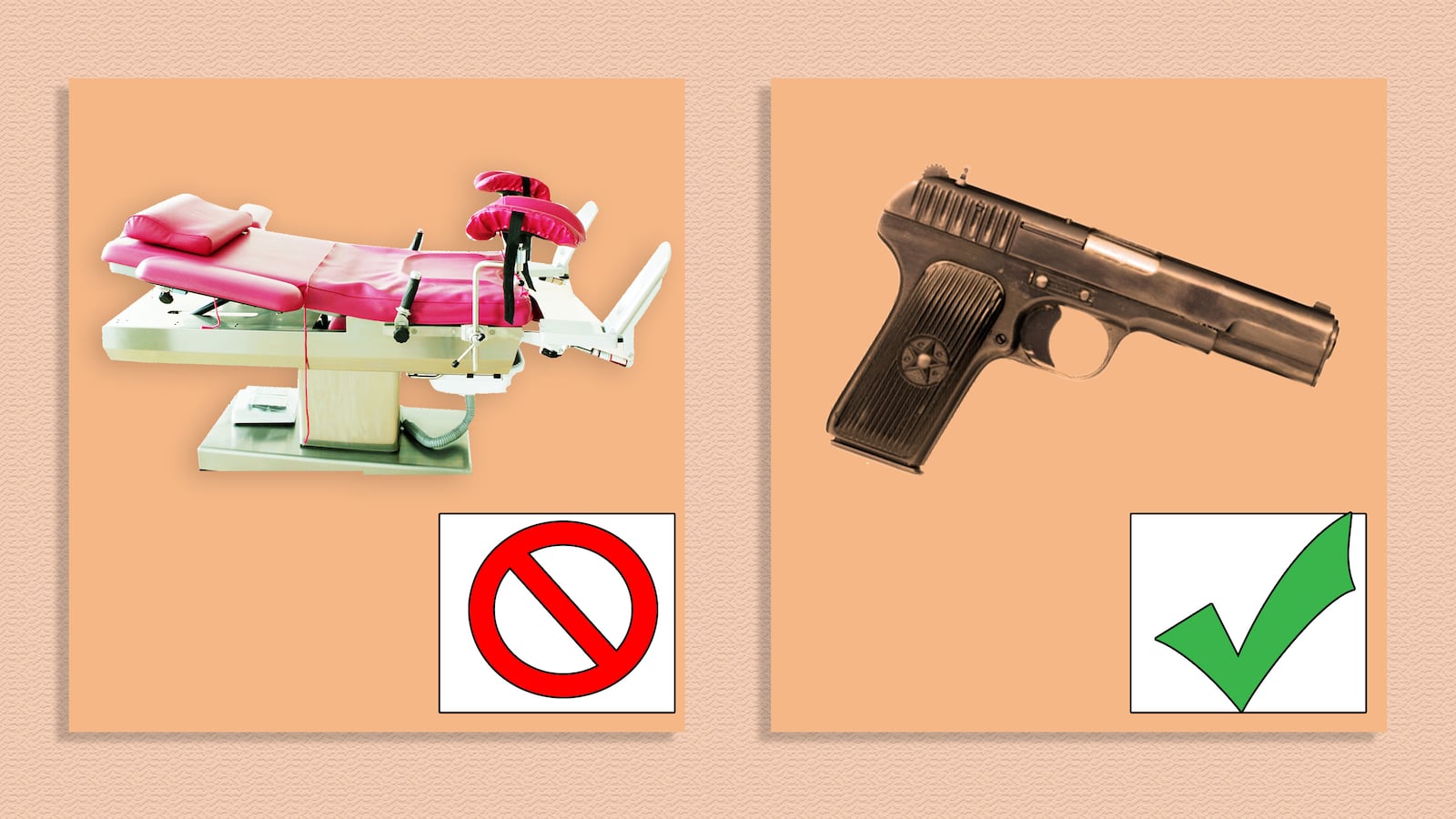Red states are shutting down abortion clinics, determining that the health care they provide is not essential. Yet gun stores and shooting ranges remain open as a supposedly essential industry.
That designation was President Donald Trump’s latest gift to the NRA, and the message it sends to women is that gun rights are sacrosanct while women’s health is subject to the whims of the anti-abortion ideologues, also known as Trump’s base.
States long hostile to abortion are using the coronavirus as an excuse to try and shutter clinics in at least six states—Texas, Ohio, Iowa, Alabama, Oklahoma and Kentucky. Planned Parenthood and the ACLU are challenging the shutdowns, and by late Tuesday, federal judges issued emergency stays in three of the states, Texas, Ohio and Alabama, while the underlying legal arguments play out.
In Texas, hundreds of patients had been turned away as the ban took effect and the state’s attorney general told an online event with anti-abortion activists, “The truth is abortion—for the most part—is an elective procedure that can be done later.”
A Los Angeles Times editorial noted, “A ‘postponed’ abortion? That’s called having the baby.”
At the same time, the administration updated a list it created last month of “essential critical infrastructure” to include gun stores and shooting ranges, setting up a contrast of women being denied urgent medical care while gun owners can enjoy their rights unimpeded.
Thus, the president and his allies have used the pandemic to reward two of their core constituencies: anti-abortion activists and gun-rights advocates.
“In times of crisis, gun sales go up, along with toilet paper. People stockpile things they don’t need,” says Jim Kessler with Third Way, a moderate Democratic think tank. “The NRA has had a bad couple of years with scandals. Trump needed to hand them a victory.”
It’s paying off rather handsomely. Gun sales are surging, exceeding even the previous record that was set after the Sandy Hook mass shooting in 2013.
The federal list is an advisory, not a directive, so gun stores and shooting ranges are more likely to be open for business in red states, and closed in blue states, underscoring the divide in the country. Most people buying guns in this climate are not first-time buyers, but already have multiple firearms, says Kessler.
“The people who use firearms are politically powerful. The people who use abortion clinics are socially and politically vulnerable. That’s an obvious difference,” says Jack Pitney, a professor of politics at Claremont McKenna College. “The other thing about the gun stores, it’s survivalists—a lot of gun owners think the apocalypse is here and they need firearms to protect themselves. A lot of them have seen Contagion.”
Hannah Shearer, litigation director with the Giffords Law Center, told the Daily Beast that most gun stores are remaining open, some with protections in place like social distancing or appointment-only hours. When they’re closed, background checks can’t be done and federal officials can’t trace guns recovered at crime scenes because they can’t access the paper records that gun dealers keep.
When the Los Angeles County sheriff closed gun stores last month after California Governor Newsom left decisions on critical infrastructure to the state’s 58 county governments, gun groups immediately sued. They claim that designating them as “nonessential” violates the Second Amendment while county officials say public health takes precedent.
“States are making decisions to limit constitutional rights to save lives. The gun industry should be treated like everybody else,” says Shearer. “We don’t think there’s anything special about the gun industry. There are lots of hard decisions we make here, but the goal is to save lives.”
She cites Harris County, Texas, where three local pastors and a hardline conservative activist are appealing to the Texas Supreme Court to allow gun stores to remain open and churches to hold in-person services as a First Amendment right. Harris County is the most populous county in the state and the third most populous in the country with over four million people.
“This goes to show that these emergency executive orders are affecting other constitutional rights as well, and necessarily so given the urgency of restricting public gatherings to prevent massive loss of life,” Shearer told the Daily Beast.
The conflict over constitutional rights, and how to balance them during a pandemic, and where to draw the line with political exploitation, will continue to dominate our discourse over the coming weeks and months.
In the case of Harris County, it’s pretty clear that the majority’s right to health and safety outweighs the need to congregate for religious worship, or to access gun stores. The toll on the women affected by the shuttered abortion clinics is of an entirely different and more immediate magnitude, as it is on the doctors and nurses and providers who deliver this care.
Texas is among the strictest of the red states, threatening $1,000 fines or 180 days in jail for abortion providers who defy the ban on their services.
“It is incredibly concerning when states would impose criminal penalties on doctors and nurses seeking to provide medical care,” says Megan Christin with the American College of Obstetricians and Gynecologists. Incredibly concerning, and an outcome that anti-abortion activists have long sought.







